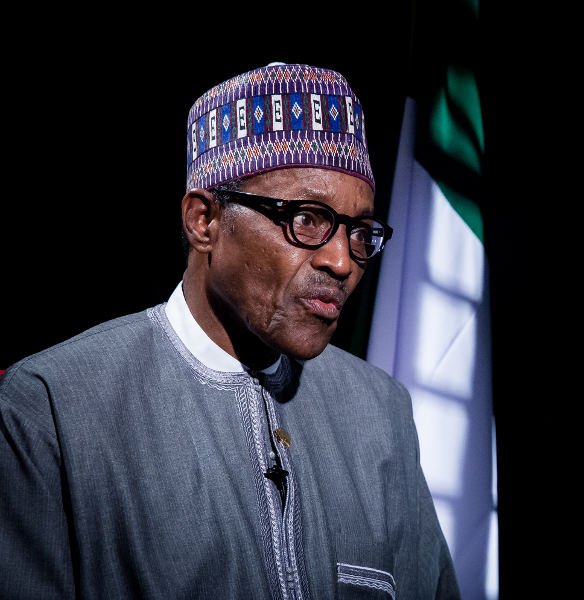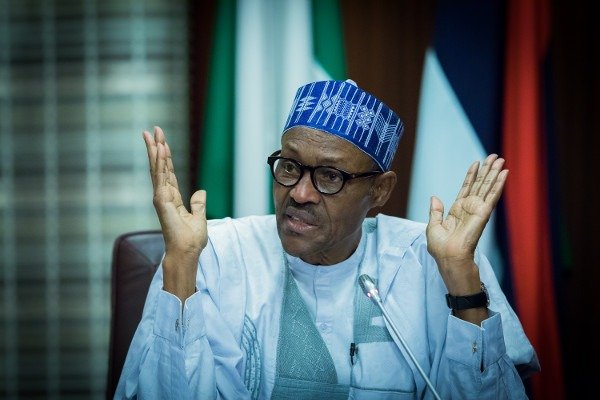Buhari Challenges IBB, Ali Gusau To Come Clean, Speaks On Why Fashola Got Three-In-One Job
What inspired you to contest the 2015 presidential election after three previous defeats?
You mean three previous rigged elections? (Laughter). You will recall that shortly before the 2011 presidential election, I had said it was the last time I would offer myself for elective position – and I meant it, but in the following years, we saw our country virtually falling apart on all fronts. People felt a rescue exercise was necessary, and a large number believed I could do it. They made overtures to me, and the pressure was so enormous that I could not say no. As they say, the rest is history.
It took six months after you came to office before you appointed ministers. With the benefit of hindsight now, could you have done it earlier?
No. People tend to forget. Two of my predecessors took five months and seven months to assemble their teams. I needed to take the time it took me to appoint ministers. The conditions we met made it necessary to take a careful look at the situation. We did not get much cooperation from the government we succeeded in terms of briefing and handover. They said we wanted to start ruling before we were inaugurated. After inauguration, we began to contend with many issues: in the public service, economy, security, and many fields. The country had been virtually vandalized, and many things had to be set right. At least 27 states could not pay salaries, crude oil price in the international market fell to around $30 from about $100 per barrel the previous ten years, and there was absolute confusion. The federal set-up had 42 ministries which we trimmed to 24, and it was only after all these that the cabinet was formed. To have done it earlier would have meant building on a weak, decrepit foundation. We promised Nigerians change and change would not have come if we didn’t lay a new foundation.
Do you think it is fair comment when people accuse your government of being too slow?
There is still a lot of wisdom in the saying, “slow and steady wins the race.” If they say we are slow, do they also say we are steady? Then, it means we will win the race eventually. There is no wisdom in being in a rush and messing up everything. You will make avoidable mistakes and end up with a lot of regrets.
 People who criticize the anti-corruption war say you have left out members of your own party who funded your election.
People who criticize the anti-corruption war say you have left out members of your own party who funded your election.
Do you just grab people along the road and take them off to court for trial just because you want to create a semblance of balance? First, there has to be an accusation which must be properly investigated, and when a prima facie case has been built, you prosecute. If any of my backers or party members has anything established against him, let’s see whether I will shield anyone from prosecution. There seems to be a preponderance of PDP members standing trial; because they had been in power for 16 years, they had access to the public treasury and abused the trust reposed in them. You can be assured that anybody caught in corruption will answer for it irrespective of party, tribe or religion.
Why did you put three crucial ministries – power, works, housing – under one man?
I said before that we met 42 ministries, which was no longer realistic. The economic realities demanded that we merge ministries, and we did. Putting three critical ministries under one man was determined by the ability to perform. This is a man who had ruled a state excellently for eight years, and as they say, the reward for hard work is more work. So, I just gave him more work to do and, so far, he is doing it. I have a lot of trust in his abilities to deliver on our promises.
What lessons did you learn from the passage of Budget 2016?
Many lessons, one of which is that we should never take anything for granted. The minister for budget and national planning did a yeoman’s job, got us a credible budget which I took to the National Assembly, bowing many times. I did not know I was just wasting time. I have been in government in one form or another since 1976, but I never heard the word ‘padding.’ It was in the process of Budget 2016 I first heard it. All our figures were changed, and some people replaced them with what they wanted. It should never happen. This delayed the signing of the budget till May, five months into the year. Such should never happen again. With Budget 2017, we will draw from the lessons we learnt.
You have been criticized for not having an economic team. Don’t you think you need one?
What do they mean by team? The vice president heads our economic management team. You have a finance minister, a budget and planning minister, a minister for trade, industries and investment, a governor at the Central Bank, a national economic adviser and others, yet some people still ask for a team. I don’t know how they define the word ‘team.’ We will listen to everybody but we are averse to economic teams whose private sector members frequently steer government policy to suit their own narrow interests rather than the over-all national interest.
Significant progress has been made in the fight against insurgency. What timeframe are you looking at in terms of resettling displaced people?
It is a huge task, which we are addressing. There is an initiative headed by General Theophilus Danjuma, which is doing a great work, and we are assisted by non-governmental organizations from within and outside the country. Resettling every displaced person is a task that must be accomplished. I don’t think setting a timeframe is the important thing. What matters more is to get the job done, and done well.
The EFCC says it would not rule out the prosecution of those who voluntarily refund looted funds.
Generally yes, but we will note the recommendation of the attorney-general of the federation. We do not want to deliberately disgrace people. All we want is public money back.
Will you be prepared to voluntarily release your medical records as we see candidates do in America?
Good health is a gift from God. Anybody can be sick, and we can also get well. There is a required level of health and wellbeing to govern, I don’t think I fall below it.
You are a calmer, more patient civilian president than you were as military head of state. Is it age, democracy, or what?
A combination of everything (laughter). I was military head of state at 42; now I am 73. Some attributes remain essentially me, but a lot has also changed. For good, I think (laughs).
What was your immediate response after the telephone call from former President Goodluck Jonathan congratulating you on your election victory?
I think it was one of the things that happened during the elections that I will never forget. He called me and, of course, we could recollect each other’s voices. He said, ‘Good evening, Your Excellency’, and I replied, ‘Good evening, Your Excellency, sir.’ Then, there was silence from both ends. Then, he said, ‘I’m calling you to congratulate you that I’ve conceded that you have won the election. Congratulations.’ Then, there was absolute silence from my end because it was a shock to me. For somebody who had been a deputy governor, governor, vice president, and president for five years to concede to an election result before the counts were completed, I think he showed some great statesmanship. Quickly, that was what came to my mind. I said, ‘Your Excellency.’ He said, ‘Did you hear what I said?’ I replied, ‘Yes, Your Excellency, thank you for your statesmanship.’ That was how I quickly overcame my shock. Certainly, for that, he earned respect, not only of Nigerians, but the world over. For our state of development politically, when a change of government is done through the ballot, for a substantive president to concede that he lost the election before the figures have been collated was unheard of.
 You said in an interview that General Ibrahim Babangida removed you from office because there was something contained in a report presented by the military council which he wanted to preempt. We interviewed General Babangida last year and asked him whether that was true. He said, it was not correct. Who is correct? You or Babangida?
You said in an interview that General Ibrahim Babangida removed you from office because there was something contained in a report presented by the military council which he wanted to preempt. We interviewed General Babangida last year and asked him whether that was true. He said, it was not correct. Who is correct? You or Babangida?
Well, for the question on my story versus IBB’s story, you can choose which one to believe. But I will stick to what I said in that interview. What happened, if you could recall, at the time (Admiral Augustus) Aikhomu was the chief of Naval Staff. We were looking for officers to make governors. Then Cross River and Akwa Ibom were one state and we needed one military officer from that state for governorship. Among the persons he gave to me was one Archibong, a naval officer. After we conducted security checks, we realised he had some problems, so I removed him from the list. So we had another Archibong in the Army, who we used to replace the naval officer. I told Aikhomu to deal with the allegations against the first Archibong. What happened to him later, I didn’t know. Not knowing that when we had the coup, I found out that some officers were spending money. I asked, ‘where did they get the money from?’ They said it was from the Military Intelligence fund. I said since it was the intelligence fund that has been used to bring somebody into power, perhaps there was no problem. Later, I learnt that General Aliyu Gusau who was in charge of intelligence took import licence from the Ministry of Commerce, which was in charge of supplies, and gave it to Alhaji Mai Deribe. It was worth N100,000, a lot of money then. When I discovered this, I confronted them and took the case of the army council. General Bali was chief of defence staff; General Babangida was chief of army staff; Tunde Idiagbon was chief of staff, Defence Headquarters, and I was the head of state. I said, if I didn’t punish Aliyu Gusau, it will create a problem for us. It’s North versus South; Majority versus Minority; Muslim versus Christian. That was what it showed. When people want to hide incompetence, they attempt to hide under religion, ethnicity, into simply political issues. So I said General Aliyu Gusau had to go. He was the chief of intelligence. That was why Babangida got some officers to remove me. Let him repeat his own story. Aliyu Gusau is still alive.
What do you intend to do with the National Conference Report?
I didn’t like the National Conference and the reason is this: ASUU was on strike for about an academic year; the tertiary institutions’ teachers were on strike, yet government had money to vote N9 billion for a conference for which the National Assembly is constitutionally there to do. So, our children can go to hell while the political situation can be manipulated? That’s why I forgot about it. I never read the report anyway.


